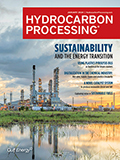
January 2024
Special Focus: Sustainability and the Energy Transition
Plastic waste is a global challenge. Today, only a minimal amount of plastic waste is recycled, mostly mechanically.
The chemical industry has shown resilience in addressing economic turbulence and supply chain disruptions after the COVID 19 pandemic.
Process Optimization
This article elaborates on the startup of a refinery’s heavy naphtha reforming unit with an alternative approach to the initial unit design, including an evaluation of several startup techniques to ensure the adequacy and practicality of the selected option.
Tüpraş utilizes proprietary fluid catalytic cracking units<sup>a</sup> (FCCUs) at its Izmit and Izmir refineries. The Izmit unit was designed in 1968 and started up in 1972 with a side-by-side style reactor/regenerator.
One of the interesting dimensions of chemical engineering is the management of processing operations related to the molecular composition of the raw material.
Catalysts
Hydroprocessing investments in sustainable fuels are gaining momentum, with a pipeline of up to $50 B expected by 2025 involving more than 250 projects, the majority of which focus on hydroprocessed esters and fatty acids (HEFA).
Heat Transfer
Combustion processes are critical for producing heat and power in nearly every industry.
Inefficient heat transfer in the convection section of a process heater is readily evident by an increase in stack temperature beyond design parameters.
Plant Turnarounds/Project Management
Planned shutdowns (SDs) are critical events that can significantly impact production and expenditures. Poor planning and preparation can directly affect the success of any SD, making attention to detail imperative.
Environment and Safety
Relying on a third party for safety assurance is like entrusting your gym instructor with your overall physical well-being.
Water Management
Water reuse within a particular industrial facility is not a new idea. Power industry facilities operating in arid areas have been designed to be “zero liquid discharge” (ZLD) for more than 20 yr.
U.S. industrial facilities with cooling towers must meet U.S. Environmental Protection Agency (EPA) and local wastewater requirements for effluent, including those under the Clean Water Act. Failing to do so can result in severe fines that quickly escalate.
Columns
For the past year, HP has been solely published on a digital platform. This evolution of the publication has provided readers with a more efficient pathway to access technical case studies written by their industry peers from around the world.
HP spoke with Maiju Helin, Head of Sustainability and Regulatory Transformation Renewable Polymers and Chemicals, Neste, regarding Neste’s lifecycle assessment report on chemically recycling waste plastic.
Trends and Resources
As countries around the world seek to limit their carbon emissions, sustainable fuels will play an important role. This category consists of a broad range of low-carbon fuels, including biofuels, eFuels and chemical byproducts.
GE Vernova’s Digital business has released its CERius™, a carbon emissions management software designed to help energy companies progress toward their net-zero goals using data precision and abatement planning capabilities.
Gulf Energy Information’s Global Energy Infrastructure (GEI) database is tracking nearly 1,100 active projects in the hydrocarbon processing industry (HPI).

- SkyNRG starts construction on its first SAF plant in Delfzijl, the Netherlands 2/13
- India's Reliance wins U.S. license for Venezuelan oil 2/13
- Singapore light distillates stocks hit over 3-yr high on robust imports 2/13
- Three contractors injured at ExxonMobil facility in Beaumont, Texas (U.S.) 2/13
- China's epic renewables boom lifts it into rare clean capacity club 2/13
- TotalEnergies booked loss in France due to refining activities, CEO says 2/13




